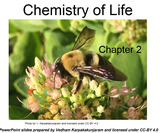
Biology

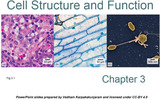


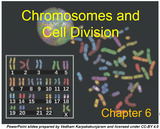

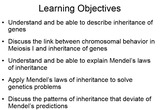
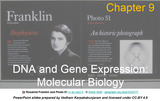
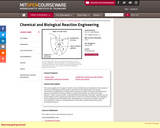
Introduces the design of chemical reactors via synthesis of chemical kinetics, transport phenomena, and mass and energy balances. Topics: reaction mechanisms and chemical/biochemical pathways; transition-state theory; batch, plug flow and well-stirred reactors; heterogeneous and enzymatic catalysis; heat and mass transport in reactors, including diffusion to and within catalyst particles and cells or immobilized enzymes.
- Subject:
- Biology
- Life Science
- Material Type:
- Full Course
- Provider:
- M.I.T.
- Provider Set:
- M.I.T. OpenCourseWare
- Author:
- Green, William Jr.
- Date Added:
- 01/01/2007
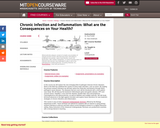
In this course we will explore the new emerging field of pathogen-induced chronic diseases. Work in this field has redefined the causes of some major disorders, such as ulcers. By reading the primary research literature we will learn about the molecular mechanisms through which pathogens cause disease. The diseases that we cover will be introduced with a short patient case study. We will discuss the bacterium Helicobacter pylori and gastric disease, HPV and cervical cancer, hepatitis C virus and liver disease, Epstein-Barr virus and lymphoma, Cytomegalovirus and atherosclerosis, as well as diabetes and multiple sclerosis. We will study technical advances in the fight against microbes and explore future directions for new treatment strategies of chronic infections and inflammation. This course is one of many Advanced Undergraduate Seminars offered by the Biology Department at MIT. These seminars are tailored for students with an interest in using primary research literature to discuss and learn about current biological research in a highly interactive setting. Many instructors of the Advanced Undergraduate Seminars are postdoctoral scientists with a strong interest in teaching.
- Subject:
- Biology
- Life Science
- Material Type:
- Full Course
- Provider:
- M.I.T.
- Provider Set:
- M.I.T. OpenCourseWare
- Author:
- Frickel, Eva
- Gredmark, Sara
- Date Added:
- 01/01/2007
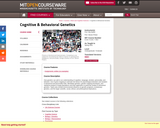
How genetics can add to our understanding of cognition, language, emotion, personality, and behavior. Use of gene mapping to estimate risk factors for psychological disorders and variation in behavioral and personality traits. Mendelian genetics, genetic mapping techniques, and statistical analysis of large populations and their application to particular studies in behavioral genetics. Topics also include environmental influence on genetic programs, evolutionary genetics, and the larger scientific, social, ethical, and philosophical implications.
- Subject:
- Biology
- Genetics
- Life Science
- Psychology
- Social Science
- Material Type:
- Full Course
- Provider:
- M.I.T.
- Provider Set:
- M.I.T. OpenCourseWare
- Author:
- Nedivi, Elly
- Pinker, Steve
- Date Added:
- 01/01/2001
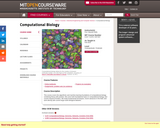
This course covers the algorithmic and machine learning foundations of computational biology combining theory with practice. We cover both foundational topics in computational biology, and current research frontiers. We study fundamental techniques, recent advances in the field, and work directly with current large-scale biological datasets.
- Subject:
- Biology
- Life Science
- Material Type:
- Full Course
- Provider:
- M.I.T.
- Provider Set:
- M.I.T. OpenCourseWare
- Author:
- Manolis Kellis
- Date Added:
- 01/01/2015
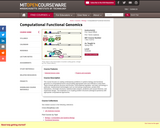
Study and discussion of computational approaches and algorithms for contemporary problems in functional genomics. Topics include DNA chip design, experimental data normalization, expression data representation standards, proteomics, gene clustering, self-organizing maps, Boolean networks, statistical graph models, Bayesian network models, continuous dynamic models, statistical metrics for model validation, model elaboration, experiment planning, and the computational complexity of functional genomics problems.
- Subject:
- Applied Science
- Biology
- Computer Science
- Life Science
- Material Type:
- Full Course
- Provider:
- M.I.T.
- Provider Set:
- M.I.T. OpenCourseWare
- Author:
- Gifford, David
- Jaakkola, Tommi Sakari
- Date Added:
- 01/01/2005

Used for students receiving Advanced Placement credit and transfer credit. Program of study or research to be arranged with a Department faculty member. Written report required. Permission of Department required.
- Subject:
- Biology
- Life Science
- Material Type:
- Full Course
- Provider:
- M.I.T.
- Provider Set:
- M.I.T. OpenCourseWare
- Author:
- Kosinski-Collins, Melissa
- Date Added:
- 01/01/2006

Concepts of Biology is designed for the introductory biology course for nonmajors taught at most two- and four-year colleges. The scope, sequence, and level of the program are designed to match typical course syllabi in the market. Concepts of Biology includes interesting applications, features a rich art program, and conveys the major themes of biology.
- Subject:
- Biology
- Life Science
- Material Type:
- Textbook
- Provider:
- Rice University
- Provider Set:
- OpenStax College
- Author:
- James Wise
- Rebecca Roush
- Samantha Fowler
- Date Added:
- 01/30/2013
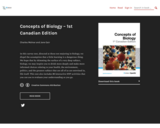
In this survey text, directed at those not majoring in biology, we dispel the assumption that a little learning is a dangerous thing. We hope that by skimming the surface of a very deep subject, biology, we may inspire you to drink more deeply and make more informed choices relating to your health, the environment, politics, and the greatest subject that are all of us are entwined in, life itself. This text also includes 80 interactive H5P activities that you can use to evaluate your understanding as you go.
- Subject:
- Biology
- Life Science
- Material Type:
- Activity/Lab
- Interactive
- Textbook
- Author:
- Charles Molnar
- Jane Gair
- Date Added:
- 05/27/2022
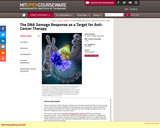
Cellular responses to DNA damage constitute one of the most important fields in cancer biology. In this class we will analyze classical and recent papers from the primary research literature to gain a profound understand of cell cycle regulation and DNA damage checkpoints that act as powerful emergency brakes to prevent cancer. This course is one of many Advanced Undergraduate Seminars offered by the Biology Department at MIT. These seminars are tailored for students with an interest in using primary research literature to discuss and learn about current biological research in a highly interactive setting. Many instructors of the Advanced Undergraduate Seminars are postdoctoral scientists with a strong interest in teaching.
- Subject:
- Biology
- Life Science
- Material Type:
- Full Course
- Provider:
- M.I.T.
- Provider Set:
- M.I.T. OpenCourseWare
- Author:
- Reinhardt, Hans Christian
- Date Added:
- 01/01/2008
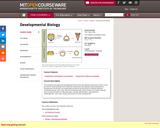
The principles involved in morphogenesis and the determination of complex cellular patterns are examined using examples from animal systems in which the tools of genetics, molecular biology and cell biology have been applied to reveal mechanism. This graduate and advanced undergraduate level lecture and literature discussion course covers the current understanding of the molecular mechanisms that regulate animal development. Evolutionary mechanisms are emphasized as well as the discussion of relevant diseases. Vertebrate (mouse, chick, frog, fish) and invertebrate (fly, worm) models are covered. Specific topics include formation of early body plan, cell type determination, organogenesis, morphogenesis, stem cells, cloning, and issues in human development.
- Subject:
- Biology
- Life Science
- Material Type:
- Full Course
- Provider:
- M.I.T.
- Provider Set:
- M.I.T. OpenCourseWare
- Author:
- Constantine-Paton, Martha
- Sive, Hazel
- Date Added:
- 01/01/2005
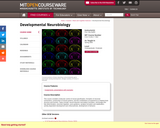
Considers molecular control of neural specification, formation of neuronal connections, construction of neural systems, and the contributions of experience to shaping brain structure and function. Topics include: neural induction and pattern formation, cell lineage and fate determination, neuronal migration, axon guidance, synapse formation and stabilization, activity-dependent development and critical periods, development of behavior.
- Subject:
- Biology
- Life Science
- Material Type:
- Full Course
- Provider:
- M.I.T.
- Provider Set:
- M.I.T. OpenCourseWare
- Author:
- Nedivi, Elly
- Date Added:
- 01/01/2005
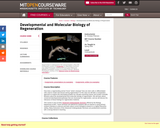
How does a regenerating animal "know" what's missing? How are stem cells or differentiated cells used to create new tissues during regeneration? In this class we will take a comparative approach to explore this fascinating problem by critically examining classic and modern scientific literature about the developmental and molecular biology of regeneration. We will learn about conserved developmental pathways that are necessary for regeneration, and we will discuss the relevance of these findings for regenerative medicine. This course is one of many Advanced Undergraduate Seminars offered by the Biology Department at MIT. These seminars are tailored for students with an interest in using primary research literature to discuss and learn about current biological research in a highly interactive setting. Many instructors of the Advanced Undergraduate Seminars are postdoctoral scientists with a strong interest in teaching.
- Subject:
- Biology
- Life Science
- Material Type:
- Full Course
- Provider:
- M.I.T.
- Provider Set:
- M.I.T. OpenCourseWare
- Author:
- Petersen, Christian
- Date Added:
- 01/01/2008